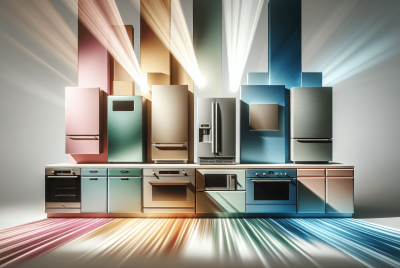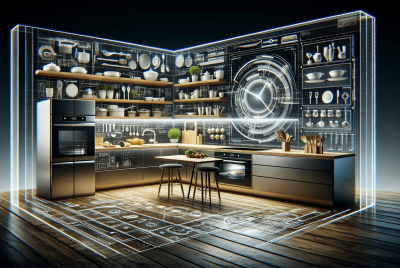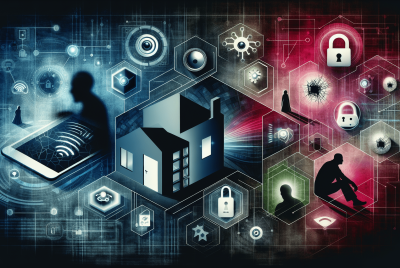What Is The Point Of Smart Appliances?
Have you ever wondered what the fuss is all about with smart appliances? You’ve probably heard the term thrown around but aren’t quite sure what it means or why it matters. Well, let’s unravel the mystery together. Smart appliances, like refrigerators, washing machines, and even coffee makers, are equipped with advanced technology and connectivity features that allow you to control and monitor them remotely using your smartphone or voice commands. But is it just a trendy gimmick or is there a genuine benefit to having these intelligent devices in your home? Let’s find out.

Convenience and Efficiency
Time-saving features
Smart appliances offer a range of time-saving features that make daily tasks more efficient and convenient. For example, having a smart oven allows you to preheat it remotely while you’re on your way home, saving you valuable time in the kitchen. Additionally, smart appliances often come with advanced timers and programmable settings, allowing you to schedule tasks and automate routines, reducing the need for manual intervention.
Remote control capabilities
One of the biggest advantages of smart appliances is their ability to be controlled remotely. Whether you’re at work, on vacation, or simply lounging on the couch, you can easily monitor and control your appliances through your smartphone or other connected devices. This means you can turn on your air conditioner to cool your home before you arrive, adjust the temperature of your refrigerator to accommodate specific items, or start the washing machine from anywhere in your house.
Optimized energy usage
Smart appliances offer various features and technologies that optimize energy usage, leading to significant energy savings. For example, smart thermostats can learn your daily routine and adjust the temperature accordingly, ensuring that energy is not wasted when you’re away. Similarly, smart washing machines can detect the size of the load and adjust water and detergent usage accordingly, reducing both water and energy consumption. Overall, smart appliances help you minimize your environmental impact while also saving money on utility bills.
Enhanced User Experience
Intuitive interfaces
Smart appliances come with intuitive interfaces that make them easy to use and navigate. The user-friendly interfaces ensure that even those who are not particularly tech-savvy can take full advantage of the appliance’s features and capabilities. Whether it’s a sleek touchscreen on a smart refrigerator or a smartphone app for controlling multiple appliances, the interfaces are designed to simplify the user experience and provide a sense of convenience and control.
Personalized settings
One of the key advantages of smart appliances is the ability to personalize settings according to individual preferences. For instance, a smart coffee machine can remember your preferred coffee strength and brewing time, allowing you to enjoy your perfect cup of coffee every morning without having to manually adjust the settings each time. Similarly, smart lighting systems can be customized to create different ambiances for different moods or activities, enhancing the overall user experience and comfort.
Smart home integration
Smart appliances seamlessly integrate with other smart home devices, creating a connected ecosystem that enhances your overall lifestyle. By integrating your smart appliances with voice assistants like Alexa or Google Assistant, you can control multiple devices with simple voice commands. Imagine being able to turn on your lights, adjust the temperature, and start your dishwasher with just a voice command. The integration of smart appliances into a broader smart home system enhances both convenience and functionality.
Improved Functionality
Advanced features and options
Smart appliances often come with advanced features and options that go beyond what traditional appliances offer. For example, smart refrigerators can provide recipe suggestions based on the items inside, help you create shopping lists, and even order groceries online. Smart ovens may come with built-in temperature probes, ensuring perfectly cooked meals every time. These advanced features enhance functionality and provide users with a more versatile and enjoyable experience in their daily lives.
Automated tasks and reminders
With smart appliances, tedious tasks and forgetfulness become a thing of the past. Appliances like dishwashers can automatically detect the level of dirtiness in your dishes and adjust the cleaning cycle accordingly, saving you time and water. Moreover, smart appliances can send reminders and alerts to your smartphone to notify you of tasks like changing the air filter, defrosting the freezer, or scheduling maintenance appointments. By automating these routine tasks, smart appliances simplify daily life and allow you to focus on more important things.
Enhanced performance
Smart appliances are designed to provide enhanced performance compared to their traditional counterparts. This can be seen in various aspects such as faster cooking times, quieter operation, and more precise temperature control. For example, a smart washing machine may have specialized washing cycles for different types of fabric, ensuring thorough and delicate cleaning. Smart appliances incorporate advanced technologies and innovations to deliver superior performance, making tasks more efficient and enjoyable.

Data Collection and Analysis
Monitoring usage patterns
Smart appliances are equipped with sensors and monitoring capabilities that collect data on usage patterns. This data can provide valuable insights into how appliances are being used and when they are most active. For instance, a smart thermostat can track the temperature changes throughout the day and learn your preferred settings. This data can then be used to optimize energy usage and create personalized schedules that align with your lifestyle and preferences.
Identifying inefficiencies
By analyzing the collected data, smart appliances can identify inefficiencies and areas for improvement. For example, a smart energy monitor can detect appliances that consume excessive energy and provide recommendations on how to reduce consumption. Similarly, a smart refrigerator can monitor food storage patterns and suggest ways to minimize food waste. By identifying inefficiencies, smart appliances not only save energy and resources but also help users make informed decisions for a more sustainable and efficient household.
Recommendation and optimization
Using the data collected and analyzed, smart appliances can provide personalized recommendations and optimizations. For example, a smart dishwasher can suggest the most efficient washing cycle based on the type and amount of dishes loaded. A smart HVAC system can recommend temperature adjustments to optimize energy usage while maintaining comfort. By leveraging data analysis and machine learning algorithms, smart appliances constantly adapt and improve their performance, making your life easier and more energy-efficient.
Cost Reduction and Savings
Energy cost savings
One of the most significant benefits of smart appliances is the potential for energy cost savings. By optimizing energy usage and reducing wasteful practices, smart appliances can significantly lower your utility bills. For example, a smart thermostat can adjust the temperature based on your daily routine and the weather forecast, ensuring that energy is not wasted on unnecessarily heating or cooling your home when it’s not needed. This intelligent energy management translates into long-term cost savings and a more sustainable household.
Reduced maintenance and repair
Smart appliances often come with self-diagnostic capabilities that can detect and alert users to potential issues before they become major problems. By promptly identifying maintenance needs, smart appliances can help prevent costly repairs and extend the lifespan of the appliances. Additionally, remote monitoring and troubleshooting features enable technicians to diagnose and resolve minor issues without the need for a physical visit, saving both time and money.
Long-term cost efficiency
Investing in smart appliances may require an initial upfront cost, but it can result in long-term cost efficiency. Smart appliances are designed to be durable and energy-efficient, which reduces the need for frequent replacements. Furthermore, with the ability to monitor usage patterns and usage efficiency, smart appliances can help users make informed decisions about energy consumption and resource usage, ultimately leading to long-term cost savings.
Increased Safety and Security
Smart sensors and alerts
Smart appliances are equipped with various sensors and detectors that enhance safety and security in the household. For example, a smart smoke detector can alert you on your smartphone if smoke or fire is detected, allowing for quick action even when you’re not at home. Similarly, smart security cameras can send real-time alerts in case of any suspicious activity. By integrating these sensors and alerts into smart appliances, users can have peace of mind knowing that their home is monitored and protected.
Remote monitoring and control
With smart appliances, you can remotely monitor and control your home’s security systems, providing an extra layer of safety. From locking doors and windows to turning on lights to create a presence at home, you can control these functions from anywhere using your smartphone. This remote monitoring and control give you complete visibility and control over your home’s security, providing reassurance and ensuring the safety of your loved ones and belongings.
Potential risk mitigation
Smart appliances are designed to mitigate potential risks and accidents in the household. For instance, a smart stove can automatically turn off if it detects that a burner has been left on for too long, preventing potential fire hazards. Similarly, water leak detectors can send alerts if a leak is detected, allowing for quick action to prevent water damage. By incorporating risk mitigation features, smart appliances provide an added layer of safety and help safeguard your home and loved ones.
Environmental Sustainability
Reduced carbon footprint
Smart appliances contribute to reducing your carbon footprint by optimizing energy usage and reducing waste. By automatically adjusting energy consumption based on usage patterns and preferences, smart appliances minimize the overall energy demand in your household. This leads to a reduced carbon footprint and a more sustainable way of living. By making small changes in our daily lives, such as using energy-efficient appliances, we can collectively make a significant positive impact on the environment.
Energy conservation
Energy conservation is a key focus of smart appliances. With features like motion sensors, these appliances can detect when a room is unoccupied and automatically adjust energy usage accordingly. For example, a smart lighting system can turn off lights in rooms that are not being used, reducing unnecessary energy consumption. By actively conserving energy, smart appliances help reduce the overall demand for energy and support a more sustainable future.
Eco-friendly practices
Smart appliances often incorporate eco-friendly practices into their design and operations. For example, energy-efficient dishwashers can use less water and detergent while still ensuring thorough cleaning. Smart thermostats can optimize energy usage and reduce heating or cooling when it’s not needed. By promoting eco-friendly practices, smart appliances encourage individuals to make more sustainable choices and contribute to a healthier planet.
Integration with Smart Home Systems
Interconnectivity and automation
Smart appliances seamlessly integrate with other smart home devices through interconnectivity and automation. This allows for smooth communication and coordination between different devices, creating a cohesive and interconnected ecosystem. For example, a smart home hub can communicate with a smart thermostat, lighting system, and security cameras to create custom scenarios like “Goodnight” or “Welcome home,” where multiple devices adjust settings simultaneously based on predefined preferences. This interconnectivity and automation make managing your smart home effortless and convenient.
Seamless device communication
Smart appliances utilize various communication protocols like Wi-Fi, Bluetooth, and Zigbee to communicate with each other and with other smart devices. This seamless device communication ensures that information and commands are relayed accurately and instantaneously. For example, when you command your voice assistant to turn off the lights, it communicates with your smart lighting system, providing a quick response. Smooth device communication is essential for the overall efficiency and effectiveness of a smart home system.
Centralized control
By integrating smart appliances into a smart home system, you can achieve centralized control of all connected devices. Whether it’s through a dedicated smart home hub or a smartphone app, you can easily manage and control your appliances from a single interface. This centralized control eliminates the need to navigate between different apps or devices, providing a streamlined and simplified user experience. With a touch of a button or a simple voice command, you can have complete control over your entire smart home ecosystem.
Future-Proofing Your Home
Technological advancements
Smart appliances are constantly evolving as technology advances. Investing in smart appliances ensures that you stay up-to-date with the latest technological advancements and future-proof your home. For example, as new features and capabilities are developed, software updates can be applied to your smart appliances, providing access to new functionalities without the need for replacement. By embracing smart technology, you can ensure that your home is equipped for the future and able to take advantage of emerging technologies.
Potential for upgrades
Unlike traditional appliances, many smart appliances offer the potential for upgrades and expansions. For instance, a smart washing machine may allow for the addition of extra features like a steam function or an automated detergent dispenser. This flexibility allows you to tailor your appliances according to your changing needs and preferences, providing a higher level of customization and adaptability. By investing in smart appliances, you have the flexibility to upgrade and expand your home technologies as new options become available.
Flexibility and adaptability
Smart appliances offer a level of flexibility and adaptability that traditional appliances cannot match. With the ability to personalize settings, adjust preferences, and integrate with other smart devices, smart appliances cater to individual needs and lifestyles. Whether you’re a busy professional, a family with young children, or an eco-conscious individual, smart appliances can be customized to meet your specific requirements. This flexibility ensures that your appliances align with your lifestyle and can be easily adapted as your needs change over time.
Controlling Appliances on the Go
Remote management
One of the key advantages of smart appliances is the ability to remotely manage them from anywhere. Whether you’re at work, on vacation, or simply away from home, you can control your appliances through your smartphone or other connected devices. This means you can start your washing machine or dishwasher, adjust the temperature of your oven, or even receive notifications on the status of your appliances, all from the convenience of your smartphone. Remote management provides you with peace of mind and the convenience of controlling your appliances even when you’re not physically present.
Convenient access from anywhere
Smart appliances offer convenient access to your appliances from anywhere in the world, as long as you have an internet connection. This means that you can preheat your oven on your way home, ensuring that it’s ready to cook as soon as you arrive. Similarly, you can monitor the progress of your laundry or adjust the settings of your air conditioner while you’re at work. This level of convenience allows you to optimize your time and make your daily routines more efficient.
Smartphone compatibility
Smart appliances are designed to be compatible with smartphones, making it easy for you to control and manage them. By downloading the respective apps for your appliances, you can adjust settings, receive notifications, and even troubleshoot issues using your smartphone. This compatibility ensures that you have access to your appliances at your fingertips, providing a seamless and intuitive user experience. With smartphone compatibility, you have the power to manage and control your appliances with just a few taps on your screen.
In conclusion, smart appliances offer a range of benefits that enhance our daily lives in various ways. From convenience and efficiency to increased safety and security, these appliances provide a multitude of features and capabilities that make our lives easier, more sustainable, and highly personalized. With the ability to monitor, analyze, and optimize usage patterns, smart appliances not only save time and energy but also empower individuals to make informed decisions for a more efficient and sustainable household. Whether it’s controlling appliances on the go or future-proofing your home, investing in smart appliances brings us one step closer to a connected, convenient, and environmentally conscious way of living.



